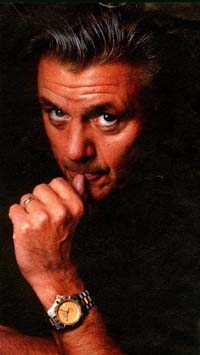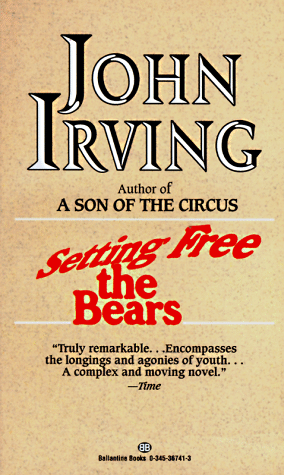 |  | Since the Spring of 1995, Messers McCue and Equinox have been loyal John Irving fans. Back in good ol' Regis High School (whose alma mater I can't think of for the life of me... I just keep singing that song from Dirty Dancing... "Join hands and hearts and voices, voices, hearts, and hands! At Kellerman's the friendship lasts 'long as the mountain stands. Daytime, nighttime, any hour, whether rain or shine... something something something something happily combine.")... anyhoo, back in RHS, in one's Senior Year he had the option to either spend his third semester in school, doing Christian Service, or in the Executive Internship Program. I, along with the cool people in my year, opted to stay in school. We were permitted to invent our own courses, and to basically just hang out... which meant a lot of sitting on the Met steps or eating cheese fries. But I digress.
The point is that McCue approached Fr. Phillip Judge about having a tiny seminar on the books of John Irving. Judge, unfamiliar with Irving himself--but like McCue, anxious to begin reading his novels--happily agreed. The seminar was small: McCue, Craig DiFolco, Tony Broccolo and Judge. Each week a different one of us would run the seminar (which I believe covered half of a novel). Surprisingly, the six of Irving's then eight novels that Judge decided to teach were the strongest of the group. Heaven only knows what we would have done with the other two, and since heaven be that one that knows, it only makes sense that a priest would correctly make this choice.
Since 1995, McCue has re-read many of Irving's works and become downright obsessed with him--the fact that he can't secure a copy of Imaginary Girlfriend is driving him insane. Only one other Irving novel has been released since that course, but we are on the brink of another. The effect that Irving has had on McCue's writing is notable and noticeable. He is not simply a cool dude who McCue has tried to emulate, but a man who was writing novels in the way McCue heartily believed they should be written. He read many other books in high school, but was ne'er as struck as he was by this mini one. Wherefor? Because he and Irving connected. They... as Holden might put it... shared a moment (of course the Ex-Exeterian didn't really pick up on it too much... in McCue's defense, J-Dubya was probably in Toronto or... more possibly... Holland).
This page shall focus on the novels, collections, and other writings of John Irving while the links listed below while focus on Irving the man and other related (at times more specific) topics. McCue is currently writing an Irving piece for Creative Screenwriting Magazine. Expect to see it in the late summer. |
 | Setting Free the Bears (1968): John Irving's first novel chronicles the adventures of two young men in Austria and Germany. They spend their time stealing saltshakers and riding motor cycles until their mission becomes the Tiergarten (the Zoo). Setting Free the Bears can't be considered as strong a first novel as say The Virgin Suicides, but it demonstrated who Irving was and what he would become. The Sentimentality, sexuality, absurdity, and 19th Century complexity are all there although the timeline of this novel (and only one other) is extremely short comparatively. Phil Judge, S.J. wisely remarked that this novel resurfaced highly improved a few years later only this time it was called The Hotel New Hampshire. |
| |
 | The Water-Method Man (1972): With The Water-Method Man Irving seems to have come into his own. Perhaps the training of the Iowa Writer's Workshop soaked in and raised Irving's writing to the next level. When comparing the two works, it is clear he has clearly identified his strengths and also realized that he is a man who writes his characters lives, not just moments in them. With this novel, Irving begins to jump into the character habits that will last through most of his works (particularly those where the main character seems to be an extension of himself): there's wrestling, infidelity, condom trouble, urinary tract infections, writing, and a kid who comes along for the ride. Also, what's important to note for Irving is the deep love his characters have for their children (despite the difficulties they may be having with the person who's genes make up the other half of their offspring's DNA strand). The main characters work in film editing and the idea of snipets juxtaposed and pasted together to form a whole becomes the blueprint for the structure of this book. |
| |
 | The 158 Pound Marriage(1974): Those who have only seen George Roy Hill's film version of Garp may not understand that The 158 Pound Marriage seems to have been completely absorbed by Garp. Here, the protagonist is a wrestling coach--hence the title: a wrestling weight class--as well as a teacher. I must admit that memory on this novel (as with Setting Free the Bears if you didn't notice by my comments' brevity) is foggy. But this is essentially a novel of infidelity, adulthood, and the survival of a marriage. Irving smartly rewrote this novel within Garp making Garp the wrestling coach, and pairing his couple with another couple their age (the wife who was a failed writer and essentially a carbon copy of the character with whom Irving has an affair with here). Luckily 158 is Irving's briefest novel (though it may not seem that way as you trudge through. |
| |
 | The World According to Garp (1978): Without a doubt, this novel is Irving's masterpiece and although people are still celebrating Owen Meany, this is the one for which he will be remembered. With Garp, Irving makes his first three novels seem like trial runs for the real thing; here it all comes together perfectly. Jenny Fields is a nurse who mounts a wonded Technical Sargent (The "T.S" of "T.S. Garp") in order to impregnate herself. The result: Garp (Christ it's hard to say that without an image of Robin Williams popping into my brain). Here Exeter is incorporated (as a fictional school) as well as Irving's writing, family (i.e. his kind of family that will return in other novels), and perhaps most notably, his politics. The novel is extremely political, directing most of its agression at the feminist movement (though it is hard to dub him a misogynist when one looks at the success of Jenny Fields). Oddly enough, Irving seems to have unconsciously written a novel that proves women to be their own worst enemies--more about that and other ideas on The Garp Page. |
| |
 | The Hotel New Hampshire (1981): As stated above, in many waysThe Hotel New Hampshire is a return to Setting Free the Bears. Here Irving takes the idea of hotel life (which is very attractive to him), and expands it to novel length. For Irving fans in the know of everything but this novel: it's "The Pension Grillparzer" with a lot more heart and a lot more length. Through all the insanity of the novel, including the incest, the bear costumes, the rape, the revolutionaries, Sorrow (no connection to the Bowie song except in my heart), and Sigmund Freud, up until this point, this was Irving's novel with the most heart. Though the main character is in love with his sister the pain of the romance and the day-to-day life of his family (although it isn't always tragic) is transmitted heartfully and with a warmth and adoration that has become synonymous with Irving since Owen Meany got the country in a tizzy. |
| |
 | The Cider House Rules (1985): After last year's academy award winning Lasse Halstrom film, The Cider House Rules is at least a title everyone knows lately (although many people follow it up with the Irving irking "Who wrote that? Updike?"). Politics is back at the center of it all with Cider House, a novel about abortion (if you want to completely distill it). To the staff here at Equinox Net, it is a novel that is perfectly constructed for Irving to pay the ultimate homage to Charles Dickens, orphans, surrogate father, unattainable beautiful women and all. Irving once again goes after his father with this piece, a man who actually did the "Burma Run" in World War II. Curiously, the grandfather Irving said he did not know to well becomes the model for Irving's most compelling father figure, Dr. Wilbur Larch. Why not take a look at my thoughts about The Cider House Rules Film |
| |
 | A Praryer for Owen Meany (1989): When McCue saw John Irving read at the Union Square Barnes & Noble, he said that none of his books would ever come close to selling as many copies as Owen Meany. Needless to say, as a long tim Irving fan, I was completely shocked. Irving has both said he based his character on Oscar Matzereth from Gunter Grass' Tin Drum and that there is no connection at all, just a coincidence in the initials. With Meany Irving attacks the Viet Nam War, Christianity, faith, and friendship. A beautiful and comedic novel--even though a bit depressing--the fatalistic style of Irving's highly calculated plots come together more perfectly here than any of his other works. |
| |
 | A Son of the Circus(1994): Inarguably Irving's darkest novel, Son of the Circus is the first time Irving steps out of the country for an entire novel (he took plenty of trips to Austria and Germany in his other books) setting his story in India. Irving originally started this novel as a screenplay when he was touring the country with a documentarian friend of his and Irving apparently has a script of the same title which is actually a different story. Here Irving follows a doctor and pulp screenwriter who is obsessed with dwarves and the interesting people who come across his path. While I disregard Setting Free the Bears and The 158 Pound Marriage as Irving novels, I consider A Son of the Circus is by far his weakest. He tries here to invoke his style and tricks from the past, but the end result is a novel that seems more someone attempting to ape Irving than a book he actually wrote. |
| |
|  | A Widow for One Year(1998): Irving's ninth novel was hailed by the critics as his most mature, though he tried to desperately deny such claims by reading the more Irving-esque passages at book tours throughout the country--like the one I intended in New York where he didn't sign any books...bitter am I?... Now how would I be bitter about something like that from three years ago. Here Irving seems between Meany and A Son of the Circus. The novel has relocated back to the northeast and is focussing on a writer, tragedy, and the perhaps overly cushy lives of the white middle and upper-classes that run headlong into the absurd once in John Irving's hands. This novel is told in parts, focussing on three moments in time. It's also considered the novel with Irving's first female protagonist, though this is completely inaccurate: is Jenny Fields to be forgotten? Her role in Garp overshadows the females of any other Irving book. |









